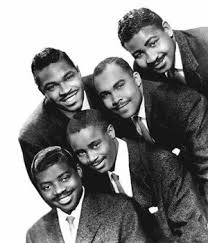It has been said that when the British Invasion bands appeared on these shores and on our radios they were bringing American music back to America. The British musicians were steeped in the knowledge of American blues, R&B, and soul in ways that most Americans just weren’t. Today’s record is a case in point; an American R&B hit that was brought back to these shores a few years later by a British Invasion band that turned the song into an even bigger hit.
The Clovers have had a long and distinguished career that began when they got together in Washington, D.C. in 1946 and goes on to this day in some fashion. The original lineup included Harold Lucas, Billy Shelton, and Thomas Woods. They were joined shortly after that by lead singer Buddy Bailey. There have been many lineup changes over the years and I won’t detail them all, but by 1948, Shelton and Woods were gone, replaced by Matthew McQuater and Harold Winsley.
The quartet released their first single, “Yes Sir, That’s My Baby,” for Rainbow Records in 1950 and soon after that became a quintet with the addition of guitarist Bill Harris. By 1951, the Clovers were signed to the fledgling Atlantic Records label. The first single for the label was “Don’t You Know I Love You,” a song written by Atlantic co-founder Ahmet Ertegun, b/w the standard “Skylark.” It was the Clovers first Top 10 R&B hit and remained on the chart for five months.
The second Clovers release for Atlantic was “Fool, Fool, Fool,” and that one went all the way to the top of the R&B chart. Bailey was drafted and replaced by John Phillip but the hits kept coming. The Clovers hits the charts with songs like “One Mint Julep,” “Middle of the Night” (another Ertegun composition), “Ting-A-Ling,” “Hey Miss Fannie,” “Good Lovin’,” “Lovey Dovey,” “Your Cash Ain’t Nothin’ But Trash,” and several other singles.
Bailey eventually returned from the Army, rejoined the group, and shared vocal duties with Billy Mitchell who had replaced Charlie White, who had replaced Phillip. Whew! The thing is, the hits never stopped, no matter who the Clovers were. “Blue Velvet,” “Nip Sip,” “Devil or Angel,” “So Young” and “I I I Love You” (the latter two songs arranged by Quincy Jones) were all hits.

In 1957, the Clovers Atlantic contract expired and their manager, Lou Krefetz, got them signed to Poplar Records the following year. Poplar was subsumed by United Artists the following year and in June 1959, the Clovers entered the recording studio to record their signature hit “Love Potion No. 9.”
The song was written by Jerry Lieber and Mike Stoller. It was released in July and this time it not only raced up the R&B chart to #23 but found equivalent success on the pop chart. It was by far the biggest hit of the Clovers long career. It was also the last time that the Clovers ever hit the R&B or pop chart but it wasn’t for lack of trying. They kept recording up until 1968 with an ever-shifting lineup and a variety of record labels. At times there was more than one band using the Clovers name, there were breakups and reunions, and the deaths of various members over the years.
A British band, the Searchers, covered “Love Potion No. 9” in 1964. Their version reached #3 on the Billboard Hot 100. Remember what I said about bringing our music back to us?
As of 2013, a legal agreement has allowed two different groups to perform under the Clovers name.





Comments